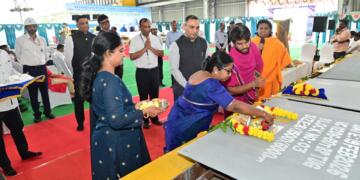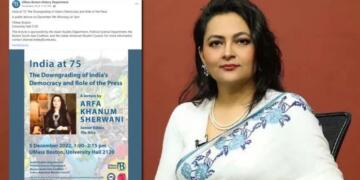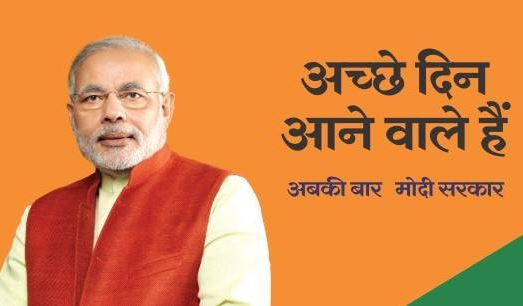It is often questioned what changed during Modi’s regime so much so that his supporters talk of ‘Achhe Din’. There are two ways of looking at it. Either through the narrow prism of politics or through the broader vision of the society. For those naysayers, questioning this as an election promise, they shall first question leaders of the parties that they support, who have ruled for long while still the ‘Garibi Hatao’ remained a truth. This piece of writing is only for those who would like to have a positive contribution.
Keeping politics aside, let us discuss actually what does it mean. Achhe Din, for many means many thing, as it is relative. A man in fear sees a snake in a rope. A greedy one mistakes bronze for silver and the thirsty one sees water in mirages.
What is the job of a Government? Or what is Governance? In true sense, the government is expected to ensure law and order (that really depends on the people and not on the government) secure borders, maintain some relations with foreign countries so that the country is not on the wrong side of rising powers and finally collect some taxes so that the government can sustain and let people lead a better life.
If someone thinks it is the job of the government to pave roads, construct railways and maintain loss incurring airlines, to run schools and hospitals and provide jobs to its people, they are wrong. These jobs were made part of the government only when the socialist doctrines were imposed on governments of both types i.e., democratically elected and that rode to power through revolutions and army coups. If anyone tries to argue that even in the times of monarchy, Kings helped to establish universities and constructed dams, please refer the ‘sustenance’ part of the definition.
But, what we had and have even today in India, was a government that dons many hats that don’t belong to it. What Narasimha Rao did when he unleashed economic reforms? He simply removed restrictions put on the way business was done. He removed the need to have ‘licenses’ issued by the government to private individuals and entities that was a necessary to do business. Without restrictions in place, individuals could make their own future.
Consider the interest rates in advanced countries. It is close to zero. And, sometimes negative. Compare this with the interest rates in any developing country like India. We earn, even today, a 7% interest rate on our deposits. Should that not make us Indians rich? Well, it would not. After adjusting for the inflation, it would be negative if we consider standard of living of the citizen in developed nations. The value of currency is notional, while the facilities are not.
After being ruled by invaders for over a millennium, India is suffering from Stockholm syndrome. We simply forgot the very reason that prompted the Arabs and the Europeans to come and conquer India was that India was better than what these nations were at that point of time. Even for a moment don’t think I am referring to the aeroplanes and plastic surgeries of ancient Indians. I was simply referring to the gold amassed by Indian Kings who also expanded their bases to the far east and had a better navy centuries prior to Marco Polo, about Indian philosophers who could affect entire east with Buddhism – while never intending to conquer these states. To quote the much authentic west, even the three wise men who declared the arrival of ‘Son of God’ were too from the east.
Well, with time everything changes. When the last of invaders were left, all that was left was a society, whose intellectuals were western influenced. All that was Indian was simply abhorred and looked down upon. I don’t mean everything that is western is bad. The fact that they are much more advanced than India shows that Indians have to learn a lot from these societies and governments and people. But, India should learn from others, not simply ape them. Every aspect that we may try to replicate in India may be studied in detail and be chosen after careful evaluation.
Our selection was a mixed one. India has chosen democracy, but a socialist one. Given the diversity India has in terms of any type of classification, it can be seen as a mini World. So, it is really difficult to define the characteristics of Indian and so of the country, except the Indian-ness or Bharatiyata. And to rule the diverse country by monarchy is next to impossible. Perhaps, that was the reason all the dynasties have disappeared even after achieving their own share of glory that was worth feeling jealous about. However, following socialist doctrine was not a wise selection, at least in my opinion. (I remind the reader, I too have the right to have my own opinion!)
Socialist principles stem out of the Utopian doctrine. Of all people living happily, like a fairy tale. Unfortunately, it is not so. Equality is the law of nature. But, equilibrium is not! The World, the Universe and thus the Nature are in eternal movement towards the equilibrium, but never are at rest and so the moment the point of equilibrium is achieved it moves further, away from the equilibrium. This is the cycle of nature.
Then, there is the question of perennial exploitation of the socially backward sections that were deprived of equal opportunities.
Yes, it is the responsibility of the government to provide equal opportunities to all sections and classes of people without any discrimination.
Exactly for that purpose, as part of affirmative action, Ambedkar introduced time bound reservations. The wise man he was, he avoided them to have an eternal validity and defined an expiry date. Unfortunately, our politicians incapable to understand the reason, have extended this time and again. What was the result? Now, every section demands reservations.
Why Ambedkar wanted the reservations to exist only for a limited period of time. Because, he understood the psyche of masses and the temptation of human mind to exploit other beings. Families that have improved their condition with the help of reservations would try to milk the advantage forever, leaving their brethren to their fate thus effectively preventing the overall enhancement of any particular section that was given the benefits of reservations. This is only natural. None in the world, with a practical and thinking mind would give up power. It takes ‘pure innocence’ to help others, and this too is a virtue of humanity. Perhaps so it was said that ‘ignorance is bliss’. And this blissful state is what all the thinking minds search since the early days of evolution.
Nature has its own way of settling things. The once mighty Vedic civilisation has gone down so much so that their sons had to live under the rule of invaders. If one states in the much abused ‘Varnasram’ terminlogy, there were Brahman kings, Kshatriya Kings, Vaishya Kings and Yadava Kings too. The power changes hands to everyone. Only, some generations of any and every class would suffer, when their time comes. That was why Ambedkar did not want the government to influence the natural process of evolution in the society, by introducing a bias. Even Ambedkar himself had rose to the seat of power, even during the heydays of caste discrimination. Children of strong parents would become weaker with the passage of time and vice versa. This is the explanation that can be given, if caste is defined as what is inherited from one’s family. If caste is defined in the way it was defined in Vedic period, it was always Kshatriyas who hold power, Brahmans who provide intellectual wisdom to the society that was sustained by Vaishyas and in which Shudras work. Mind you, there never was any fifth class that was defined in Vedic scriptures. Even a non-Aryan can become one of them, depending on his character. And, all are Aryans, as they thought their was a society of gentlemen.
Well, coming to the present state of India, as long as the society remains the way it is now, Good Times would not come to the average Indian. Time would be Good, only to Good people. Perhaps, this was what Modi was trying to do, in his own way. Perhaps, India had not seen a mass leader after Gandhi and Vinoba Bhave, who talked about hygiene and social responsibility. It is not because Japan had a better government, they could dominate the world economics for long. In fact, Japanese governments were next to Italian governments in terms of stability. But, they never stood in the way of their people’s progress. And, it was the personal integrity of Japanese that caused Japan to rise in the eyes of world, after the massive destruction. Even after the nuclear debacle, Japanese think very high of themselves bordering on being labelled racist. Without such superiority complex, it is difficult for a society to progress. The society that criticises itself could never progress. At the best, it can produce only bandits, the way Somalia produced pirates and Talibans became poppy farmers.
We have heard a lot about many ‘Rights’ of people in the last one and half decade. We also heard ‘Rights’ of workers and peasants for many decades prior to that. What was missing from the scene was ‘Responsibility’. Constant talk of only rights has turned the society into an irresponsible one. And, an irresponsible society cannot complain about some sections of it. And, why we were talking of only rights and was it not correct? Well, it was totally correct to talk of rights, but talking of only rights without responsibilities was wrong.
How come the talk on rights has increased so much? Because, corruption had spread its tentacles into all corners of the government and society, so much so that the increased greed of some has usurped rights of others. It is obvious that corruption means not only profit to some, but also a loss to some. As the corruption is reduced in the government and society, the need to talk of rights too would reduce while people can be reminded of their responsibilities. Let the government sit back collecting its taxes and implementing the rule of law. This is what the current government is trying to do. Unlike destruction, construction is a long process. It took more than a decade to reconstruct the world trade centre building, that had collapsed in one moment of a terrorist act. And, it was only a building. Considering we are talking of a nation that was subjected to degradation for long, it is only natural to have the broken spirit to be rebuilt and rekindle the confidence.




























